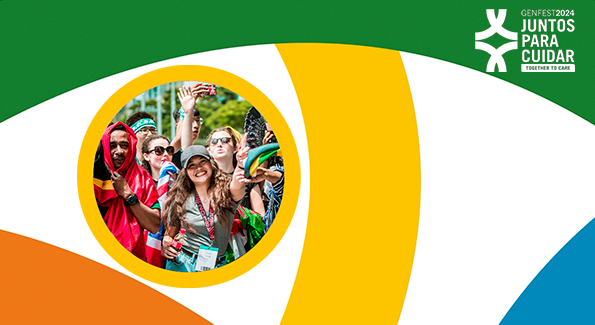
Genfest 2024: Together to care
“Peace between peoples, the care of the planet, economics and politics that put the person, justice and dignity at the centre. At the Genfest we will work, discuss and plan for this at a worldwide level”. This is what the youth of the Focolare Movement say, explaining the gathering of thousands of young people for this international event from the 12th to the 24th of July. The event “Juntos para cuidar” aims, as the title suggests, to promote care together at a worldwide level for the most vulnerable and distressed individuals and sectors of humanity, regardless of cultural, ethnic or religious differences.
In this period of change, a new cultural paradigm is needed, no longer based on the individual, but on social relationships open to all in a culture of universal fraternity. In this perspective complexities are valued rather than eliminated, in a deeper understanding of the story of humanity and its peoples.
Genfest 2024 will have three phases: voluntary work, a main event, and the creation of groupings (‘communities’) according to academic or professional interest, which will remain connected and work for the furthering of a more united world in countries of origin. It aims to be an immersive experience, where the leaders and thinkers are the youth themselves. Dialogue and collaboration between generations will be the essential components for the changes to be proposed to international institutions. Some parts of the event will be streamed on the Genfest 2024 Youtube channel.
As a conclusion, the new steps and existing or nascent projects which aim to build a more united and peaceful world will be brought together in a document to be presented to the United Nations Summit of the Future (22-23 September 2024). It will contain projects and practical ideas for a more just and fraternal world, as a contribution to the UN 2030 Agenda.
Those who cannot participate in the main event in Brazil can find an event nearer to home. There will be 44 local Genfests: in South Korea, India, Sri Lanka, The Philippines, Pakistan, Vietnam, Jordan, Egypt, Burundi, Tanzania, Angola, Zambia, Kenya, Ethiopia, South Africa, DRC, Ivory Coast, Cameroon, Burkina Faso, Peru, Bolivia, Mexico, Guatemala, Argentina, Hungary, Serbia, Czech Republic, Slovakia, Germany and Italy.
Juntos para cuidar: the programme
Experience – The first week of Genfest, from the 12th to the 18th of July, is an “immersive” experience of voluntary work in one of 40 projects and organisations offering opportunities in various countries of Latin America and elsewhere. These activities are the result of collaboration with UNIRedes, which brings together more than 50 organisations, projects and social movements in 12 countries of Latin America and the Caribbean, promoting transformation in various spheres (art and culture, the environment, democratic government, education, work, etc.) through the active commitment of all those involved.
Celebrate – From the 18th to the 21st of July the youth will come together for the main event at the National Shrine Arena in Aparecida. They will hear experiences and share strategies for peace and fraternity also through artistic and musical presentations. The event will be streamed to more than 120 different countries. It will be a wide-ranging festival of ideas and initiatives and inspire thousands of young people of many different cultures, ethnic groups and religions to live for a united world.
Learning and sharing – The third phase is from 21st to the 24th of July. The young people will come together in eight groupings called ‘communities’, according to their fields of interest: economics and work, interculturality and dialogue, spirituality and human rights, health and ecology, art and social commitment, education and research, communication and media, active citizenship and politics.
In these spaces the young people will learn, discuss, and formulate new ways of shared commitment to spread the culture of fraternity, through local projects in a global perspective. Returning to their countries of origin, they will work locally in their preferred sector, growing in a culture marked by fraternity and relationality.
An international team of academics, professionals, social and political activists and leaders – young and old – will assist the participants in their discussions and group work.
Among those who have confirmed their presence: Luigino Bruni, economist (Italy), Choie Funk, architect and social activist (Philippines), Jander Manauara, rapper and activist (Brazil), Carlos Palma, coordinator of Living Peace (Uruguay), Myrian Vasques, Indigenous advisor (Brazil), Silvina Chemen, director of the Centre for Interreligious Dialogue at the Rabbinic Seminary (Argentina), John Mundell, director of the Vatican Laudato Si Action Platform (USA), Nicolas Maggi Berrueta, violinist, Peace Ambassador (Uruguay), Israa Safieddine, education consultant and specialist in the teaching of Islam (USA).
Stefania Tanesini


